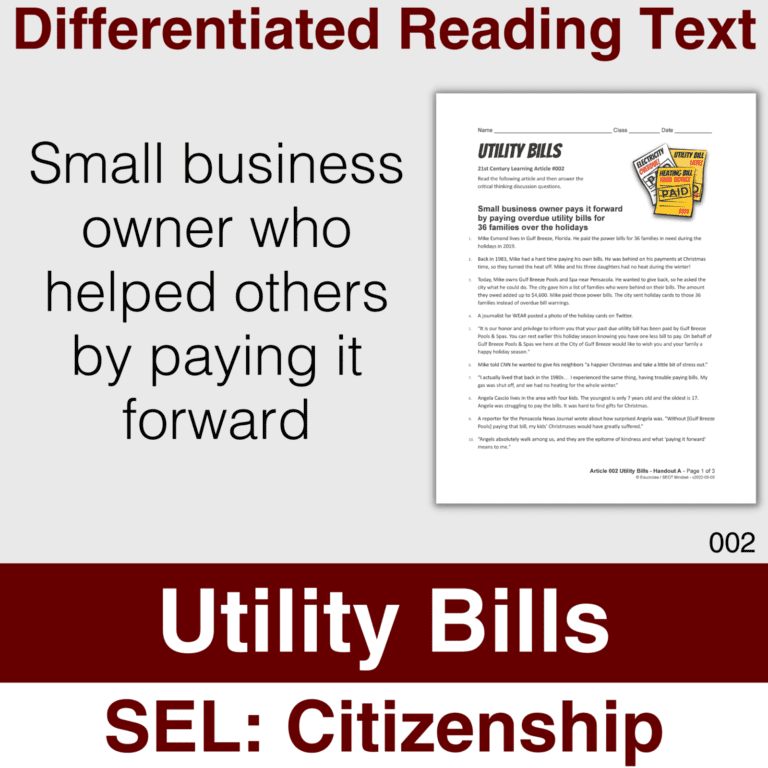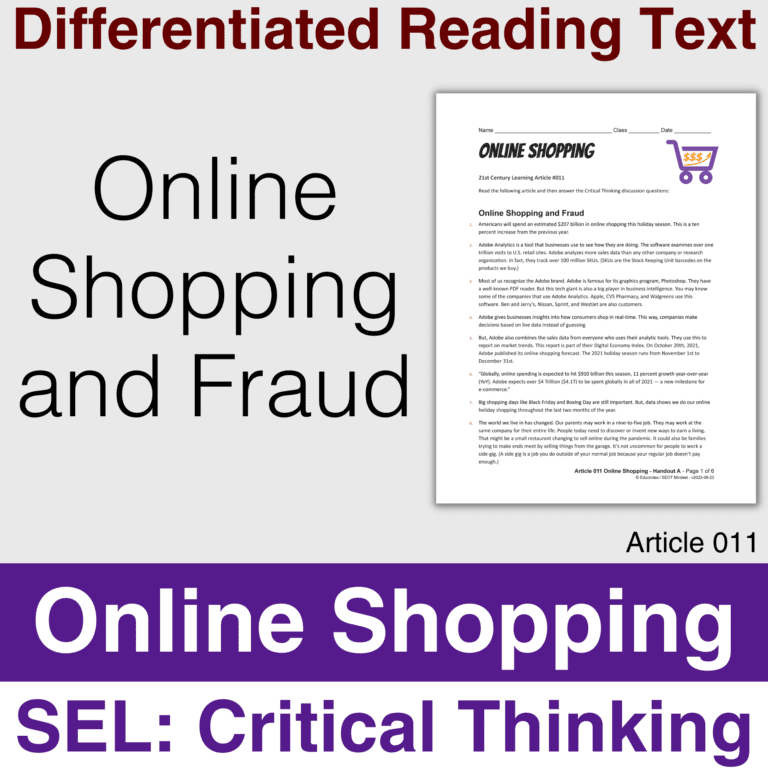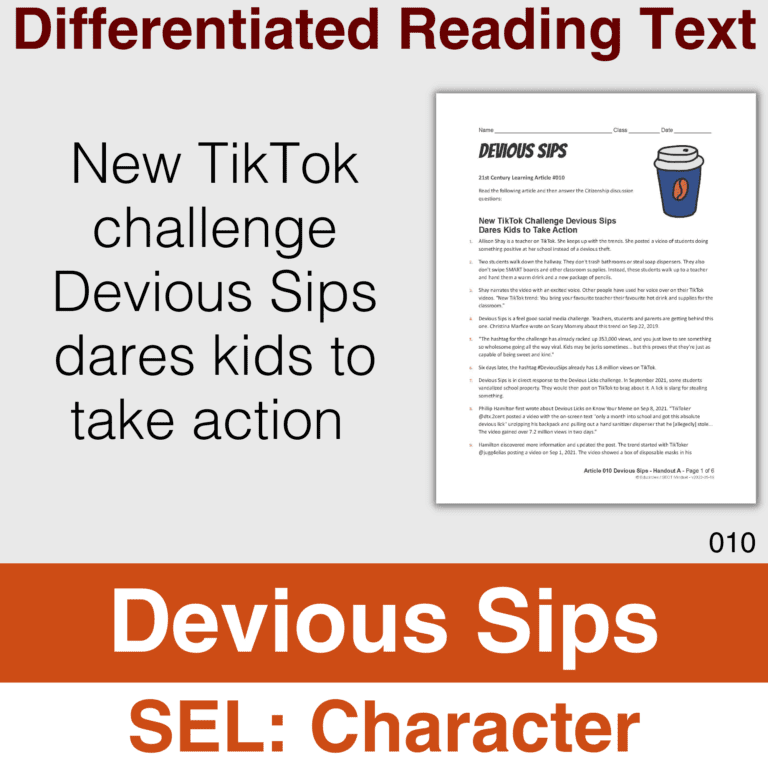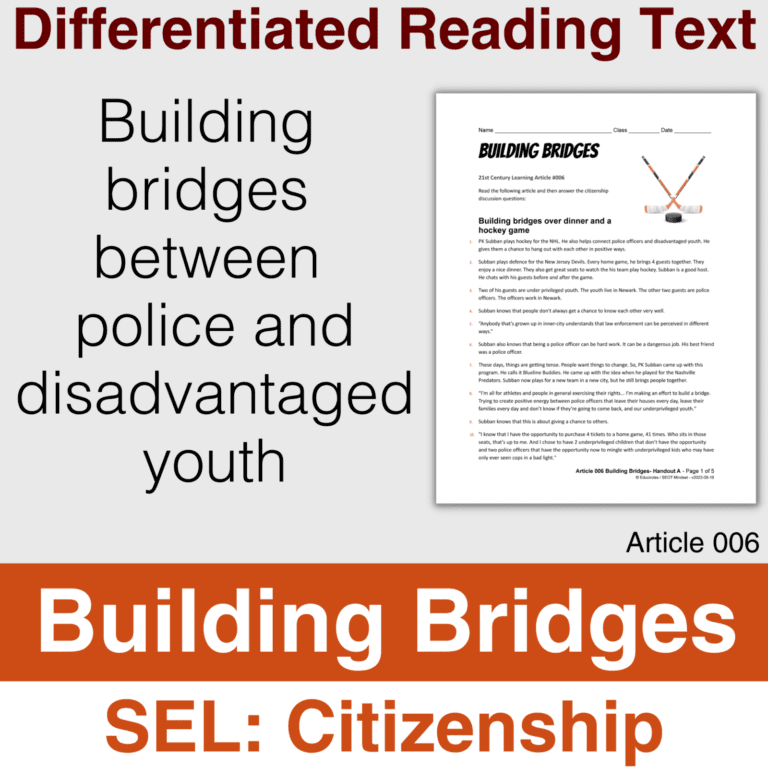High-interest CRITICAL THINKING reading article.
- A school prevented a boy with autism from bringing his service animal to class.
- A Human Rights Tribunal said this was okay.
- Students explore multiple points of view to try to make an informed decision about whether this was systemic discrimination.
This reading comprehension article handout is differentiated at four grade levels:
- approximately grades 5, 7, 9, and 11.
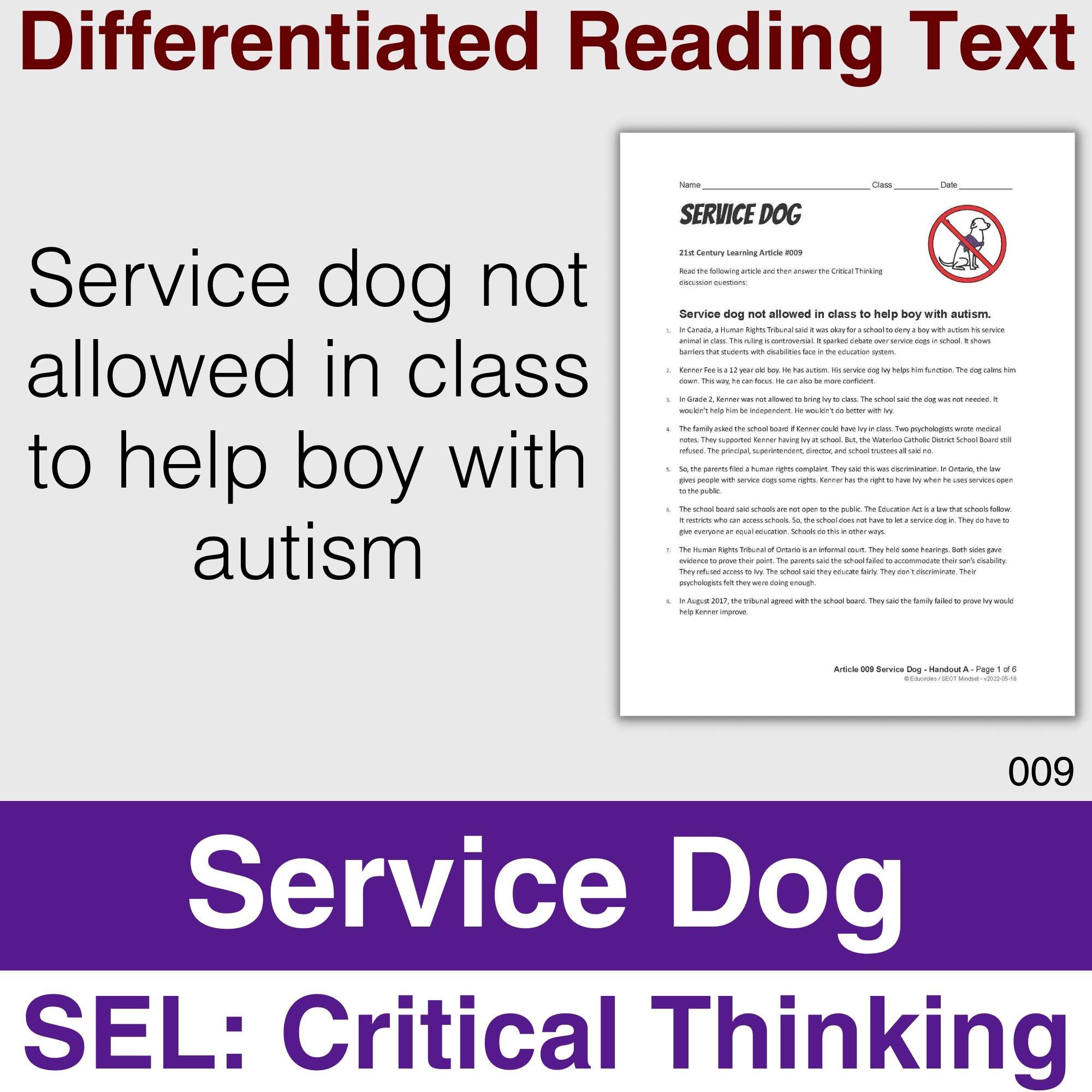
Want to see exactly what you get before you buy this product?
- Watch the PREVIEW VIDEO
- Look at the PREVIEW PDF.
(It is a watermarked version of the entire PDF resource.)
This article goes well with the INFERRING reading strategy.
This informational text is about Critical Thinking and how to seek out high-quality information from both sides to help make an informed opinion about controversial topics.
In Canada, a Human Rights Tribunal said it was okay for a school to deny a boy with autism his service animal in the class.
This ruling is controversial. It has sparked debate over service dogs in school. It also shows barriers that students with disabilities face in the education system.
The takeaway message is that we can make more informed decisions by becoming full-minded.
- It’s important to think about the information you have.
- Then, try to figure out what information you might be missing.
- Finally, we need to go out and look for that missing information and consider how it might be right.
Students get an opportunity to think about different points of view:
- the parents who say this is discrimination,
- the school board who says what they provide is enough,
- the human rights tribunal that agrees with the school board, and
- an accessibility lawyer that says the human rights tribunal failed.
Service dog not allowed in class to help boy with autism.
In Canada, a Human Rights Tribunal said it was okay for a school to deny a boy with autism his service animal in class. This ruling is controversial. It sparked debate over service dogs in school. It shows barriers that students with disabilities face in the education system.
Kenner Fee is a 12 year old boy. He has autism. His service dog Ivy helps him function. The dog calms him down. This way, he can focus. He can also be more confident.
In Grade 2, Kenner was not allowed to bring Ivy to class. The school said the dog was not needed. It wouldn’t help him be independent. He wouldn’t do better with Ivy.
The family asked the school board if Kenner could have Ivy in class. Two psychologists wrote medical notes. They supported Kenner having Ivy at school. But, the Waterloo Catholic District School Board still refused. The principal, superintendent, director, and school trustees all said no.
So, the parents filed a human rights complaint. They said this was discrimination. In Ontario, the law gives people with service dogs some rights. Kenner has the right to have Ivy when he uses services open to the public.
The school board said schools are not open to the public. The Education Act is a law that schools follow. It restricts who can access schools. So, the school does not have to let a service dog in. They do have to give everyone an equal education. Schools do this in other ways.
The Human Rights Tribunal of Ontario is an informal court. They held some hearings. Both sides gave evidence to prove their point. The parents said the school failed to accommodate their son’s disability. They refused access to Ivy. The school said they educate fairly. They don’t discriminate. Their psychologists felt they were doing enough.
In August 2017, the tribunal agreed with the school board. They said the family failed to prove Ivy would help Kenner improve.
Michelle McQuigge is a journalist. She summarized the 52 page ruling. She wrote an article in Global News. “The decision says Kenner Fee’s family failed to prove that having his black Labrador Ivy in the classroom would help him with his education.”
The tribunal thought the school board was doing enough. They said Kenner had a chance to succeed like everyone else. They also thought the school proved he didn’t need Ivy in class.
“[They] found that the Waterloo Catholic District School Board took all necessary steps to evaluate whether the dog was needed in the classroom, and supported the board’s decision not to allow the service animal to sit beside Kenner during lessons.”
Fred Gore is the Director of Schools for some private schools. He worked with Kenner and Ivy during the summer. This was at St. Jude’s school. St Jude’s is a temporary alternative to the public system. Bright and gifted students experiencing learning exceptionalities can go there.
The school board told the tribunal that Kenner was not visibly upset in the classroom. Fred was not at the tribunal. But, he talked with CTV Kitchener News. “If they can’t see that Kenner is getting upset, visibly upset, then they don’t understand autism. He can’t function without his dog. He needs Ivy with him.”
Loretta Notten is the Director of Education for the WCDSB. The WCDSB gets public funds. (It is not a private school system.) She gave a statement after they won. She said the board’s decisions were upheld by the tribunal. She talked about how the school board works. They bring each student to their “fullest potential.”
“We do have a policy that allows for service dogs, and we follow a consistent process for each child and make decisions based on a case by case basis. . . . As a board we have a responsibility to all our students and must make decisions in their collective best interest, balancing our resources to serve all to the best of our ability.”
Amy Fee is Kenner’s mother. She is also an elected politician. She works for the province. In 2019, she talked about a new government rule. Schools must allow service dogs when it supports the student’s learning needs.
“For some families they’ve been struggling for years to try and get their child to be able to attend class with their service animal. It can be a child with autism who struggles to regulate their emotions and through the use of their autism service dog is able to attend class, be with their peers and confidently participate in their education.”
This human rights ruling in 2017 is still a hot topic. David Lepofsky is a respected lawyer and professor. He is the Chair of the Accessibility for Ontarians with Disabilities Act Alliance. In 2020, he wrote an article. He said the Human Rights Tribunal failed.
“This case painfully illustrates the serious and unfair disability accessibility barriers that students with disabilities too often still face in Ontario’s education system. It shows how families are unfairly required to repeatedly fight against the same barriers, at school board after school board.”
David gives the following example.
“A school board would not be viewed as being sensitive to a student’s needs if it concluded: You don’t need those eyeglasses . . . , in order to read. Glasses . . . are a form of dependency that you should avoid. We’ll instead give you large print books and documents, and that is enough to meet your needs.”
The family has done a lot. But, Kenner is still not allowed to bring Ivy to class.
Critical Thinking Mini-Lesson
Sometimes, we make a quick decision based on limited information.
It’s easy to jump to simple conclusions about complex issues – especially when we feel passionately about the issue or the topic is controversial. (Controversy means a prolonged public disagreement about something that people feel strongly about.)
Being full minded is a critical thinking strategy we can use to help us form a logical opinion about a controversial subject. It means you try to fill your mind with high-quality information to help you make a better informed decision.
- First, think about the information you have. What point of view or perspective does this information represent? Is this primary source information directly from someone involved in the issue? Or, is this a secondary source of information that includes some opinion or analysis of a primary source of information?
- Then, try to figure out what information you might be missing. Who might have a different or opposite point of view? Where could we get information directly from the source so we can form our own opinions?
- Finally, go out and look for that missing information. Consider how it might be right. Try to be open minded as you get information that disagrees with what you believe. Start from the other point of view and work your way backwards to your point of view.
Now, you can make a more informed decision because your mind is more full.
Reading Comprehension Questions
Based on the article and the Critical Thinking mini-lesson, how would you answer the following questions:
- Why does the school board not allow Kenner to have his service dog in class?
- What reasons can you find that are directly stated?
- What reasons can you find that are implied?
- Why does Kenner and his family want the service dog in class?
- What reasons can you find that are directly stated?
- What reasons can you find that are implied?
- What barriers (if any) did Kenner’s family face trying to get the school to allow their son’s service dog in class?
- Why do you think the human rights tribunal ruling was controversial? (Controversial means a public disagreement that goes on for a while with strong emotions on both sides)
- Look at the direct quotes used in this article. How does the author show when they insert, alter or remove words in the original quote? How does this affect the reader’s ability to be full minded?
- What would help us to be more full minded in thinking about this issue? What information are we missing?
- Everyone learns in different ways. Should students be allowed to choose the way they learn in class? Be full minded as you explain your thinking.
BONUS QUESTION
Systemic discrimination is when a system (like a government or school board) has policies that seem neutral but they actually have unfair effects on some groups of people.
Kenner is still not allowed his service dog in class. Is this an example of systemic discrimination? Why or why not?
